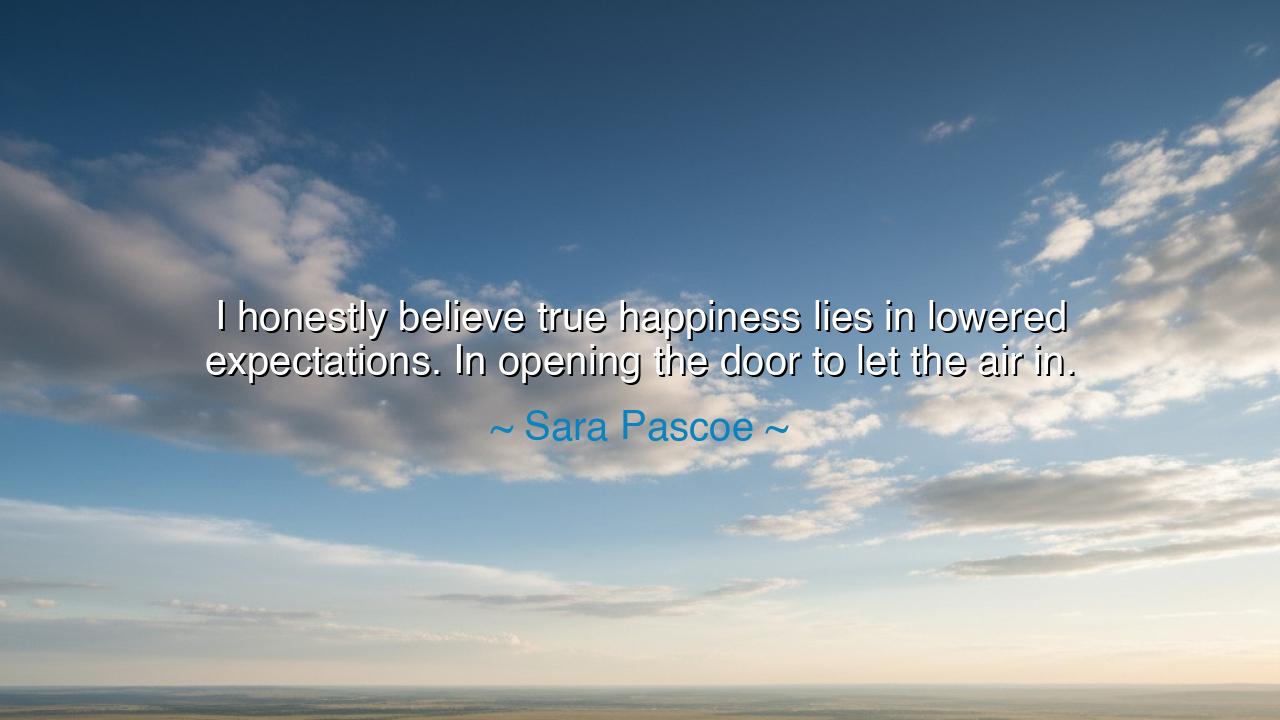
I honestly believe true happiness lies in lowered expectations.
I honestly believe true happiness lies in lowered expectations. In opening the door to let the air in.






When Sara Pascoe said, “I honestly believe true happiness lies in lowered expectations. In opening the door to let the air in,” she was not speaking from cynicism, but from deep human understanding. Her words carry the quiet wisdom of one who has wrestled with the illusions of perfection and found peace not in control, but in acceptance. In this simple yet profound statement, Pascoe reveals a truth that has eluded many since the dawn of ambition—that happiness is not born from having more, achieving more, or expecting more, but from loosening our grip on what we think life owes us. To “open the door and let the air in” is to stop suffocating the spirit with demands and to breathe again in the freedom of what is.
Sara Pascoe, an English writer and comedian, is known for blending humor with insight, exposing the vulnerability beneath our modern striving. Her life and art both reflect the tension between aspiration and reality, and the liberation that comes when one surrenders to imperfection. In this quote, she touches upon an ancient paradox: that expectations—so often hailed as the source of motivation—are also the root of disappointment. The higher we set the pedestal of our desires, the more fragile it becomes beneath the weight of reality. Pascoe’s wisdom calls us back to humility and presence, reminding us that true happiness is not a prize to be won, but a state to be allowed.
The origin of this thought stretches far beyond her words, echoing through the ages. The Stoic philosophers of Greece and Rome taught much the same: that to live well is to align our expectations with the nature of the world. Epictetus, once a slave and later a sage, wrote that suffering arises not from events themselves, but from our judgments about them. He urged his students to release their insistence that life conform to their will, and instead to embrace reality as it unfolds. This is what Pascoe means by “opening the door”—to stop trapping life in the stale air of our control, and to let the unpredictable winds of existence move freely again.
Consider the story of Helen Keller, who, though born into silence and darkness, found light within herself. If anyone had reason to despair at the world’s failure to meet expectation, it was she. Yet she transformed her life not through demanding more of the universe, but by awakening to its gifts. “I am only one,” she said, “but still I am one.” Keller found happiness not by wishing for sight or sound, but by opening the door to what remained—the love of others, the wonder of thought, the beauty of touch. Her life is a living embodiment of Pascoe’s message: that when we release our tight grasp on what life should be, we begin to notice the quiet miracles of what it is.
Pascoe’s words also speak to a deeper psychological truth. When we build our expectations too high—of ourselves, of others, of the world—we create an invisible prison. We measure every experience against an imagined ideal, and in doing so, we blind ourselves to simple joy. The air, in her metaphor, represents reality itself: unfiltered, imperfect, but vital. To open the door is to practice vulnerability—to admit that life cannot be managed into perfection. It is the act of surrender, which paradoxically brings the greatest peace. When we stop demanding constant happiness, happiness begins to enter quietly through the open door.
There is a gentleness in lowered expectations, but it is not weakness. It is strength—the courage to meet life as it is, and not as our pride would have it be. The great Eastern teachers, too, have long understood this. Lao Tzu, in the Tao Te Ching, wrote, “He who knows that enough is enough will always have enough.” When we cease to chase the unattainable, we reclaim the present moment—the only place where joy can truly dwell. Pascoe’s wisdom, though clothed in modern humor, stands in the same lineage as these timeless teachings: a reminder that contentment is found not in control, but in clarity.
So, my children of restless hearts, take this teaching into your days: lower your expectations, not in despair, but in grace. Do not demand perfection of the world, or of yourself, for neither was made to obey your will. Instead, learn to open your door—to breathe, to notice, to receive. Find happiness not in what you lack, but in the soft air that enters when you stop closing life out. When disappointment visits, greet it not as an enemy but as a teacher, whispering, “See how small your cage has become.” And when joy arrives, let it flow freely through you, uncontained, unearned, and enough.
For as Sara Pascoe teaches, happiness is not a conquest of the mighty, but a gift to the humble. The one who lowers their expectations does not give up on life—they finally let life in. And in that stillness, in that breath, in that open door where the winds of reality move as they please, the heart discovers what it has sought all along: a peace that does not depend on perfection, and a joy that asks for nothing more.






AAdministratorAdministrator
Welcome, honored guests. Please leave a comment, we will respond soon